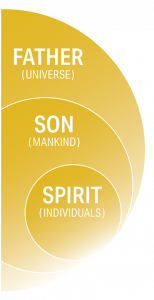GOD’S ACTIONS PROCEED FROM HIS CHARACTER
In the Topics so far, we’ve seen God only from the standpoint of how he functions (his trinity). This is as limiting as trying to understand a person solely by observing what he does without regard to why he does it.
The Bible says God is a divine PERSON. Therefore, convictions, feelings and motivations lie behind his actions. To really understand God, we need to inquire about his personal character.
DISTINGUISH BETWEEN ‘DOING’ AND ‘BEING’
The Bible reveals two dimensions to God: One dimension is what he does, the other is who he is. One dimension is FUNCTION, the other is CHARACTER.
It’s the distinction between doing and being. Since we’re made in the image of God, we understand this concept because the same distinction can be made of us. A person’s visible doing always proceeds from that person’s invisible being.
For an accurate concept of God, we need to understand both his FUNCTION and his CHARACTER. Topics 40-45 tell us about his function (how he works as a trinity) and Topics 46-50 tell us about his character (why he does certain things). The better we understand God, the easier it is for us to place our faith in him.

GOD’S CHARACTER: HOLY, JUST AND LOVE
From study of the Bible, we discover that God has three dominant and inter-locking attributes: He’s HOLY... he’s JUST... he’s LOVE. All three parts of his trinity have these attributes.
When we comprehend the attributes, we know not only what God DOES but also who God IS. Then we can better understand the purpose behind his actions.
WE MOVE NOW FROM TECHNICAL TO PRACTICAL
We can learn something about a man by observing the house he built. We can learn considerably more by reading his correspondence. But we learn most by meeting him personally and living with him.
It’s the same with God. Observing his universe gives us some information... reading the Bible gives us more... but knowing him personally gives the greatest understanding.
All of the Topics so far in this resource have been somewhat technical – about God’s existence... spiritual design... people’s beliefs... Bible evidence... Bible summary... and trinity function.
All of this is interesting and important, but now we come to the heart of Christianity: God’s CHARACTER – the essence of who he is, the explanation for what he does, and the kind of help he offers.
GOD IS THE SOLUTION TO PERSONAL PROBLEMS
Throughout history people have been saying that God, somehow, is the solution to our problems. That kind of thinking seems to be built right into us.
Yet for all the religious activity in the world, simple observation shows that very few people find much solution in God. That must be either because God is remote, indifferent and/or weak or because most people don’t really know him.
The inquiry in the remainder of this site is to discover whether or not God can, and will, help a person in practical ways. It’s one thing to believe in God – to know that he exists somewhere in outer space – and something quite different to have a relationship with him that has personal daily benefit.
How God helps us
In the preceding Topics, we’ve learned things to know about God. Now in the following Topics we’ll learn how to actually know God, personally!
When we know him personally, we get wonderful practical benefits, not only after death (see Topic 50) but also right now. He’ll help us with the problems of daily living.
It’s his trinity FUNCTION that gives him the means to help and it’s his CHARACTER that gives him the desire to help.
Here’s a partial list of problems God has promised to help us with:
- Guilt
- Loneliness
- Grief
- Relationships
- Disappointment
- Bad memories
- Poor health
- Depression
- Addictions
- Lack of motivation
- Failure
- Weariness
- Fear
- Self image
Knowing God isn’t an academic matter; it’s highly relational and practical. In fact, it’s the key to our happiness!
Here's a sampling of what the Bible says on this subject.
Psalms 33:5
God’s character – holy, just, love
Matthew 11:28-30
Jesus invites everyone to bring their problems to him
For help, see Topic 29.








 How he appears to us depends upon what he’s doing from our perspective at any particular moment.
How he appears to us depends upon what he’s doing from our perspective at any particular moment.
 This concept conjures up images of a grandfatherly old man in a white robe sitting on a throne... Jesus Christ, his son, at his side... accompanied by a mysterious ghost-like someone or something. Some people project this imagery even further by seeing Mary, Jesus’ earthly mother, as a kind of deity in this scene.
This concept conjures up images of a grandfatherly old man in a white robe sitting on a throne... Jesus Christ, his son, at his side... accompanied by a mysterious ghost-like someone or something. Some people project this imagery even further by seeing Mary, Jesus’ earthly mother, as a kind of deity in this scene. Water is an example of a single essence that functions in three modes. It’s essence is always two hydrogen atoms connected to an oxygen atom (H2O), but it functions variously as liquid, solid and gas. It looks and acts differently in each mode, but it’s always the same essence.
Water is an example of a single essence that functions in three modes. It’s essence is always two hydrogen atoms connected to an oxygen atom (H2O), but it functions variously as liquid, solid and gas. It looks and acts differently in each mode, but it’s always the same essence.




